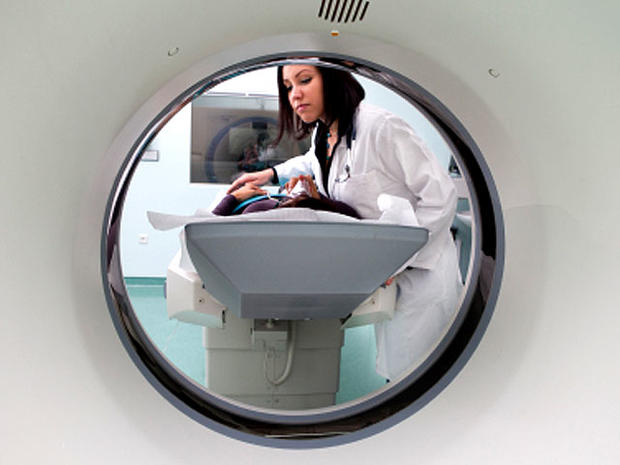IMRT is best radiation for early prostate cancer, study finds
(CBS News) When it comes to treating early stage prostate cancer, a newer radiation treatment does not appear to give men the best bang for their buck.
Ryan O'Neal and Warren Buffet have prostate cancer: What are stages 1 and 2?
Ultrasound prostate cancer treatment may reduce side effects, study shows
PICTURES: Prostate cancer self-defense: 9 deadly myths
Researchers from the UNC Lineberger Comprehensive Cancer Center in Chapel Hill say localized prostate cancer radiation known as intensity modulated radiation therapy (IMRT) outperforms a newer, increasingly popular technique called proton therapy.
"Patients and doctors are often drawn to new treatments, but there have not been many studies that directly compare new radiation therapy options to older ones," study author Dr. Ronald Chen, assistant professor of radiation oncology at the University of North Carolina at Chapel Hill, said in a university news release.
IMRT sends small controlled beams at a tumor from many angles, with the beam shape changing hundreds of times throughout treatment, according to the Mayo Clinic. That helps the radiation dose bend around important healthier tissues. Proton therapy precisely targets the shape of a tumor with protons that move through the body and interact with electrons to release energy, delivering high-dose radiation to cancerous cells and sparing health issue, according to MD Anderson Cancer Center.
For the study, researchers conducted "comparative effectiveness research" for radiation treatments for early-stage prostate cancers by looking at data collected between 2000 and 2009 on 13,000 patients with prostate cancer that did not spread (non-metastatic). The study found little difference in the need for additional cancer treatment between men treated with IMRT and men treated with proton therapy. What's more, men treated with proton therapy were more than 30 percent more likely to suffer gastrointestinal side effects.
"This paper is the strongest evidence yet that proton beam (therapy) is not only not better, but probably not as good as IMRT," Dr. Matthew Cooperberg, a urologist from the University of California, San Francisco, who wasn't involved with the study, told Reuters.
Not to mention cheaper - the Charlotte Observer reports machinery required for proton therapy can cost more than $125 million and works out to about $50,000 per patient, compared with IMRT which costs $30,000 (and has also been criticized in the past for being too costly).
IMRT was also shown to be more effective than conventional 3D conformational radiation therapy, the study found. Men treated with IMRT were almost 20 percent less likely to need additional cancer treatment, compared to men treated with conformational therapy.
Reuters reports that in 2000, less than 1 percent of prostate cancers that hadn't spread were treated with IMRT. By 2008, the number shot up to 96 percent.
"For prostate cancer in this country, we have completely adopted IMRT," Chen told WebMD. "I don't see anybody going back to 3D therapy. And thankfully, our study does show it is better in terms of cancer control and reducing long-term side effects. So IMRT is here to stay."
Chen's study is published in the April 18 issue of the Journal of the American Medical Association.
Dr. Tim Carey, director of the Sheps Center at UNC, said in a release, "This type of research is critical, comparing one type of treatment with alternatives, so that patients and their providers can arrive at the best decisions for each individual."
Not everyone agreed.
"This study didn't go far enough, and there is no question that there needs to be more studies, and there will be," Leonard Arzt, executive director of the National Association for Proton Therapy, told the Charlotte Observer. "And we have always advocated that prostate patients should do their own homework, speak to their physicians and make their own decision, the right decision for all the factors including their age, their PSA score and their psychological state."
Early stage prostate cancer has been in the spotlight recently with announcements from famed financial guru Warren Buffet and actor Ryan O'Neal that they have stage 1 and 2 prostate cancer respectively, HealthPop reported.
According to the American Cancer Society, there will be about 241,740 new cases of prostate cancer and about 28,170 men will die of prostate cancer this year alone.
The American Cancer Society has more on prostate cancer.

